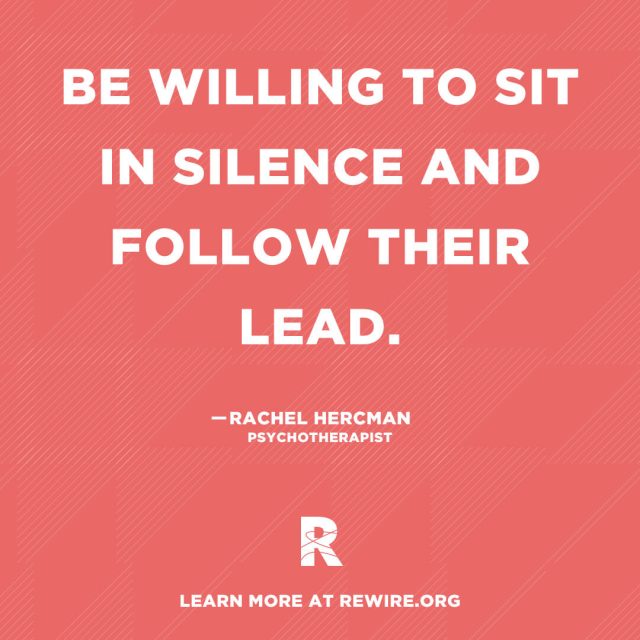
By Katie Moritz | Rewire
Grief can be uncomfortable. Especially if it’s not your own.
It might be hard to admit, but navigating other people’s grief can be awkward and uncertain. When a friend is grieving, you want to support them and help them. But, because everyone has different values and experiences when it comes to grief, it can be hard to know what to do. Your instinct might not always be right.
“People grieve differently,” said California-based therapist Lauren Consul. “Even people in the same family, grieving the same loss may have wildly different responses. The best thing you can do is be present for your friend. … Do not try to solve their grief or make it better, because you cannot. For some, this may mean sitting with them in silence, holding them while they cry, or it could mean giving them space.”
How do you know what to do for your friend? Ask them. But offer some suggestions to get the ball rolling and avoid the common misstep of asking them broadly what they need from you, said Consul and Sherrie Dunlevy, author of “How Can I Help? Your Go-To Guide for Helping Loved Ones Through Life’s Difficulties.” That question can feel too overwhelming.
 “The problem is, most grieving people simply don’t know what they need at this time, and they are not likely to pick up the phone and ask for help,” Dunlevy wrote in her book. “Instead of asking them what they need, perhaps it would be better to offer them suggestions as to how you might help, such as running errands, doing laundry or driving them somewhere.”
“The problem is, most grieving people simply don’t know what they need at this time, and they are not likely to pick up the phone and ask for help,” Dunlevy wrote in her book. “Instead of asking them what they need, perhaps it would be better to offer them suggestions as to how you might help, such as running errands, doing laundry or driving them somewhere.”
Dunlevy wrote the book after the death of her son.
“My husband and I lost a few of our closest friends because they never showed up for us when we needed support the most,” she said.
Grief experts, from therapists to morticians, shared their top tips for helping a friend who is navigating a major loss.
Don’t try to stop or hijack the process
“The biggest mistake we make when trying to help a friend grieve is to try to stop them from grieving. For many of us, it is uncomfortable to watch someone cry, or to sit with someone who is sad. So we try to say or do things to make their pain stop. What we need to be doing is honoring that experience and that emotion. … Make sure you are asking what they need, and not just doing what you think you’re supposed to do in that situation. Remember that everyone grieves differently. Not everyone wants a house full of flowers and casseroles.” — Marissa Geraci, mental health counselor
Don’t complicate things
“No need to do anything. Just be there for them. If tears come up, cry with them. If laughter comes up, laugh with them. Be an ear for what they have to say.” — Allen Klein, author of “Learning to Laugh When You Feel Like Crying”
Ask if you can help with funeral arrangements
“The death of a friend or family member can feel overwhelming and oftentimes there are choices to make about belongings, funeral, burial, etc. You don’t need to take over unless asked to, but offer to run errands or to make phone calls.” — Alisha Powell, therapist
Encourage them to stay connected to the person they lost
“I have really found encouraging the person left behind to establish a continuing relationship with the person who died is so very useful. With the attitude that the person is with us but in a different form, the mourner can look for ways that the loved one made a difference in the community, and they can look for ways to maintain his values through projects, carry out anonymous acts of kindness… and continue to participate in activities that they enjoyed together. It is empowering to maintain a relationship with the person who died, no matter how private or invisible.” — Elizabeth Fournier, mortician at Cornerstone Funeral Services
Avoid meaningless platitudes
“Time does not heal all wounds, and even if it does, it feels like forever until it gets better. Making meaning of a loss is something that only the person who experienced the loss can decide or conclude; others telling them it’s a blessing in disguise is not helpful and can be insensitive.” — Rachel Hercman, clinical psychotherapist
Help them work their emotions out
“Writing is great. Yelling is great. Throwing rocks at trees is mean, but great. I once encouraged a woman to go to Goodwill and buy a box of dishes and throw them against the walls inside her garage. She moved mountains ahead in her grief process.” — Elizabeth Fournier
Stay in touch
“Just call them. If they pick up, then you can talk to them. Of better yet, let them talk to you. If they don’t answer, you can leave a message of support. They are listening and feeling the love you are sending. Sending cards with notes inside from time to time are very nice too, and it allows you to show your love and support without burdening them with having to respond.” — Sherrie Dunlevy
“Make a date with the survivor two weeks after the services end, when everyone else forgets in their lives that someone else’s is now radically different.” — Jill A. Johnson-Young, CEO and clinical director at Central Counseling Services and author of “Your own path through grief: A workbook for your journey to recovery”
Remember how much energy it takes to grieve
“Offer to cook for them or complete daily household chores that may be neglected. Grieving can often mean that someone has trouble with daily tasks. Don’t just offer your condolences but do something practical.” — Alisha Powell
“You can say, ‘I want to do something to support you. I can either bring you dinner, take you to get a massage or do your laundry. If you do not want to choose, I will choose for you.’ Then your friend does not have to feel bad asking for help or expend energy reaching out. Often a griever is just trying to make it through the day.” — Lauren Consul
Don’t make it about you
“Understand that your friend may push you away and go into a funk, and its not about you. They may choose to confide in others and not in you. Try to respect distance they may create and have patience.” — Rachel Hercman
Don’t treat death as taboo
“Continue to talk about the person who died. Say their name, bring them up in conversation and ask questions about them. This should not be done only right after the death, but more importantly in the months and years that follow. People often do not want to bring up the dead for fear of ‘making the other person sad,’ but the person is already sad. When you bring up their loved one you not only show that their loved one is still remembered, but you are validating your friend’s experience of continuing to think about that person and grieve their loss.” — Lauren Consul
Remember the anniversary
“On the anniversary of a loss, it can be mean a lot to someone grieving to get a text from a friend noting the date. Something as simple as ‘I know the anniversary is this time of year and I just wanted to tell you I’m thinking of you’ can go a long way.” — Rachel Hercman
Encourage them to see a professional
“A real big one is seeking professional help if feelings become overwhelming. There are specialists the mourner can talk to who will listen to them, and they actually know what to say.” — Elizabeth Fournier
![]() This article originally appeared on Rewire.
This article originally appeared on Rewire.
© Twin Cities Public Television - 2018. All rights reserved.
Read Next



